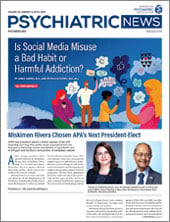Last year, the Food and Drug Administration (FDA) approved three novel medications related to psychiatric disorders. Of these, two made big headlines:
lecanemab, the first amyloid antibody to demonstrate some clinical benefits in Alzheimer’s; and
zuranolone, the first oral medication for postpartum depression.
At the end of September 2023, after 20 years of trying, the antidepressant Exxua (gepirone hydrochloride extended-release tablets) also received the green light from the FDA. Exxua, manufactured by Fabre-Kramer, modulates serotonin activity in the brain; however, it does so in a manner that is different from selective serotonin reuptake inhibitors (SSRIs). While SSRIs block the reabsorption of serotonin into cells, gepirone specifically activates one serotonin receptor called 5-HT1A.
That specificity offers the benefit of fewer side effects, the company noted. Notably, the
Exxua label does not include sexual side effects or weight gain as potential adverse events. In clinical studies, the most common side effects were dizziness, nausea, and insomnia.
In a
press statement following the approval, Exxua manufacturer Fabre-Kramer noted the favorable safety data including lack of sexual side effects was based on data from over 5,000 patients.
But as Exxua becomes available at pharmacies this year, it may be worth considering whether this medication—which enters a much more crowded market than lecanamab or zuranolone—is innovative enough to find a foothold, especially given a history of multiple FDA rejections and some questions over its efficacy.
A Long and Winding Road
Though many medications submitted to the FDA for approval require multiple attempts, the clinical path of gepirone could be one for the history books. Organanon first submitted gepirone to the FDA in 2001, with a package of data that included one positive phase 3 clinical trial. In that
randomized trial of over 200 participants with depression, adults who took gepirone on average experienced a 9.04-point decrease in the 17-item Hamilton Depression Rating Scale (HAMD-17) after eight weeks, compared with a 6.75-point decrease among adults who took placebo.
These findings were not enough to
convince the FDA, which in 2002 told the company it needed two large trials with positive results for consideration. Organon submitted another application at the end of 2003, which added the results of a trial
measuring depression relapse following gepirone discontinuation. While this trial did show that patients maintained with gepirone had a lower relapse rate (23%) than those who discontinued (35%), the FDA did not consider the results “positive”; the agency believed that not every eligible patient was included in the data.
Fabre-Kramer, who had initially acquired gepirone 1993 but then transferred the drug license to Organanon in 1998, took back the license of this drug in 2005. Though recruitment was slow, the company eventually conducted a
second randomized trial of symptom reduction with 238 adult participants; results were similar to the first trial—participants’ HAMD-17 scores were about about 2.4 points greater with gepirone compared with placebo.
So, in 2007, incorporating these new data, a New Drug Application for gepirone was submitted for the third time to the FDA and was subsequently rejected. In this instance, the agency acknowledged the two positive phase 3 results but said that negative outcomes in several smaller depression studies left doubt as to whether gepirone was effective. Fabre-Kramer appealed this decision in 2012, which eventually led to a hearing with the FDA’s Psychopharmacologic Drugs Advisory Committee (PDAC) in December 2015.
The hearing did not go the company’s way, as the committee ruled in a
9-4 vote that the negative results outweighed the two positive trials. Although that seemed to be the end of the road for gepirone, the following year the FDA overturned the committee’s decision and stated there was enough evidence to demonstrate effectiveness. The company was told it could resubmit a New Drug Application, which it eventually did in 2022, leading to approval last year.
A Drug Worth Considering in Some Cases
“It took a while, but the FDA eventually got it right,” said David Pickar, M.D., a private practice psychiatrist and an adjunct professor of psychiatry at both Johns Hopkins University School of Medicine and the Uniformed Services University of the Health Sciences. Pickar was a member of the PDAC committee in 2015 and one of the four members who supported moving gepirone forward.
As he explained, the problem he saw was that the advisory committee decided to assess the medication’s clinical performance based primarily on HAMD-17 improvements. Though this ostensibly allowed for easier comparison of the data, Pickar pointed out that several of the negative trials did not choose the HAMD-17 as the primary outcome; it was a secondary measure in these trials. He noted that the primary measures for clinical trials must be identified ahead of time, and those should be the outcomes prioritized in reviews.
“This is a classic FDA maneuver,” he said, “but you cannot change the rules after the fact.”
Pickar acknowledged that “Gepirone is not the greatest drug out there,” citing the modest 2.5 point improvement on the 52-point HAM-D scale. All things considered, though, he would like to see more well-tolerated medications of moderate efficacy than a push toward agents like ketamine that come with potent side effects, cognitive disruptions, and a high potential for abuse.
“By demonstrating a lower level of side effects, Exxua may indeed be a popular choice in the near future,” added Madhukar Trivedi, M.D., the Betty Jo Hay Distinguished Chair in Mental Health and Julie K. Hersh Chair for Depression Research and Clinical Care at the University of Texas Southwestern Medical Center. Trivedi was not involved in the clinical development of this medication.
As with a few other newly available psychiatric medications, cost will be one obstacle for many patients, which Trivedi sees as an overarching problem in mental health care. “Cost issues seem to be very selective to psychiatry; you don’t see rheumatology constantly required [by insurers] to go with the cheapest options first.”
Trivedi believes that cost concerns can be alleviated once psychiatrists are better able to predict which antidepressant—new or old—has the best chance of success with each patient.
In the case of Exxua, individuals with anxious depression could be good candidates, he noted. Gepirone is chemically related to buspirone, an FDA-approved anti-anxiety medication that is also used off label as an adjunct in depression. Supporting this, a follow-up analysis of the original clinical trial data found that adults with
anxious depression who took gepirone had a greater response than those with nonanxious depression.
The greater goal, Trivedi said, is to fulfill the potential of precision psychiatry. “These new antidepressant approvals have been welcome, but now let’s find the biomarkers that can match the right medication with the right patient.” ■

